Finding A Real Estate Career with a Chicago MBA

The number of MBAs who pursue a real estate career may not be as large as those in finance or consulting, but even still, some of the most prestigious business schools in the Chicago metro offer MBA programs that specialize in the field. Continue reading…
The California MBA Program Guide

If you’re looking to earn a California MBA, where should you go to school? Should you choose a top MBA program in Los Angeles or San Francisco? Both cities offer beautiful weather, gorgeous beaches, and world-class business education, but is one location better than the other?
Los Angeles vs. San Francisco
To get started, it’s necessary to compare the cost of living in Los Angeles and San Francisco. According to Numbeo, the world’s largest database containing user contributed data about cities, San Francisco is far and away the more expensive place to live. You would need $7,748.24 in San Francisco, CA to afford the same lifestyle that you can have for $5,700 in Los Angeles. That’s just over $2,000 more per month needed to live in San Francisco, and here’s how that’s broken down.
- Consumer Prices:98 percent higher in San Francisco
- Rent Prices: 51 percent higher in San Francisco
- Restaurant Prices: 62 percent higher in San Francisco
- Groceries Cost: 8 percent higher in San Francisco
- Local Purchasing Power: 77 percent higher in San Francisco
Right off the bat, it’s obvious that the cost of rent (real estate) is what will eat up most of your paycheck in San Francisco, but is that offset by anything? Here are the other things to consider when choosing between San Francisco and Los Angeles.
- Industries
- Los Angeles is ranked top in the country for manufacturing with over 500,000 workers in the industry. Other top industries include banking and finance (more than 100 foreign and domestic banks), entertainment, and tourism.
- San Francisco, on the other hand, is known as Silicon Valley (with San Jose) for its technology companies and startups (Intel, Apple, Genentech, Google, Uber, and Twitter). It’s also a great city for finance, global business, medical science, biotechnology, tourism, and fashion apparel (home of the Levi Strauss & Co headquarters).
- Economic Development: According to the Center for Jobs, San Francisco far and away outperforms Los Angeles in terms of economic growth and development with the Bay Area growing year-over-year while LA has struggled with almost consistent decreases.

- Top Companies: California is home to 53 Fortune 500 companies, second only to NYC. And more of those companies are located in the Bay Area compared to Los Angeles. San Francisco is home to Apple (3), McKesson (5), Chevron (19), and Wells Fargo (25). While Los Angeles is home to Aecom (161), CBRE (214), and Reliance Steel & Aluminum Co (320).
Los Angeles vs San Francisco MBA Programs
The next step is to compare the top three MBA programs in each city. In particular, we wanted to take a look at the tuition rates (two years), GMAT averages, and post-graduation salaries at each program in each city to get a well-rounded picture.
There are a few things to note right away.
- San Francisco is home to more highly ranked MBA programs with two ranking in the top ten on every list. However, it’s important to note that both cities have programs that rank well and are considered top tier schools.
- The average tuition in each city is fairly even. However, the most expensive ($137,00) and the most affordable ($77,000) schools are located in San Francisco, whereas Los Angeles is more even regarding tuition across the board.
- You’ll need a better GMAT score to go to a school in San Francisco, and that GMAT score translates into a higher salary after graduation. San Francisco graduates earn about $11,000 more per year compared to their LA counterparts.
Here’s how it all breaks down per school.
Top 3 Los Angeles MBA Programs
Anderson School of Management – UCLA
The UCLA Anderson School of Management offers a full-time MBA, a part-time MBA, an Executive MBA, and a UCLA-NUS Global MBA (Asia Pacific) program. It’s considered one of the top business schools in the world, ranking 6th in the Economist, 15th in Forbes, 16th in the U.S. News & World Report, and 25th in Financial Times.
- Tuition Rates (two years): $117,176
- GMAT Averages: 719
- Post-Grad Salaries (Mean): $119,964
Marshall School of Business – USC
The Marshall School of Business at USC offers a full-time MBA program, a part-time MBA, an Executive MBA, and IBEAR (International Business Education and Research) MBA, and an Online MBA program. The school’s full-time MBA program is ranked: 20th in the U.S. News & World Report, 33rd in Forbes, 59th in Financial Times, and 65th in the Economist.
- Tuition Rates (two years): $116,361
- GMAT Averages: 703
- Post-Grad Salaries (Mean): $115,309
The Paul Merage School of Business – University of California, Irvine
The Paul Merage School of Business has both a full-time MBA program as well as a part-time fully-employed MBA program. In addition, the school offers an Executive MBA and a Health Care Executive MBA program. The business school is ranked highly across multiple rankings including 41st in Forbes, 42nd in the U.S. News & World Report, 56th in the Economist, 64th in Financial Times.
- Tuition Rates (two years): $87,661
- GMAT Averages: 652
- Post-Grad Salaries (Mean): $97,808
Top 3 San Francisco MBA Programs
Haas School of Business – UC Berkeley
The Haas School of Business offers a full-time MBA, part-time MBA, and Executive MBA program. Haas is ranked as one of the top business school’s in the world ranking in the top ten on every list: 7th overall in U.S. News & World Report and 7th overall in the Economist, as well as 9th overall in Forbes, and 10th overall in the Financial Times.
- Tuition Rates (two years): $117,444
- GMAT Averages: 725
- Post-Grad Salaries (Mean): $125,573
Stanford University Graduate School of Business
The Stanford University Graduate School of Business offers only a full-time MBA program, but it’s one of, if not the top two-year program in the world. When looking at how Stanford GSB stacks up to the competition, the rankings speak for themselves with all in the top ten and most in the top five, including: 1st overall in the Financial Times, 2nd overall in Forbes, 4th in the U.S. News & World Report, and 9th in the Economist.
- Tuition Rates (two years): $137,736
- GMAT Averages: 733
- Post-Grad Salaries (Mean): $144,455
UC Davis Graduate School of Management
At the UC Davis Graduate School of Management, MBA applicants can apply to the full-time MBA or the part-time MBA program. Once again, UC Davis is one of the top schools in the world, ranking 37th in the U.S. News & World Report, 63rd in Forbes, and 67th in the Economist.
- Tuition Rates (two years): $77,698
- GMAT Averages: 669
- Post-Grad Salaries (Mean): $97,695
California MBA Breakdown in Charts
When breaking down the data between MBA programs in Los Angeles and San Francisco, here’s what it looks like
California MBA Tuition (Los Angeles vs. San Francisco)
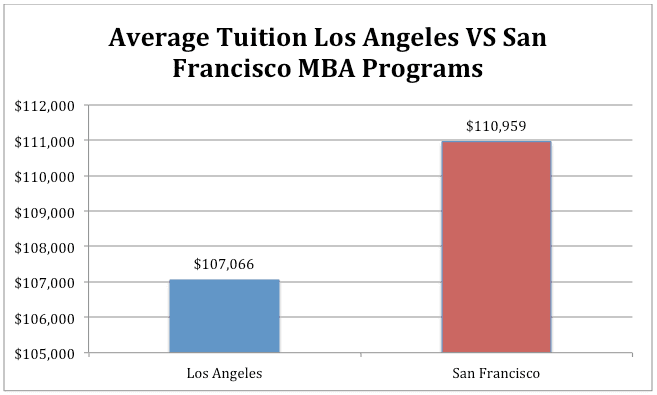
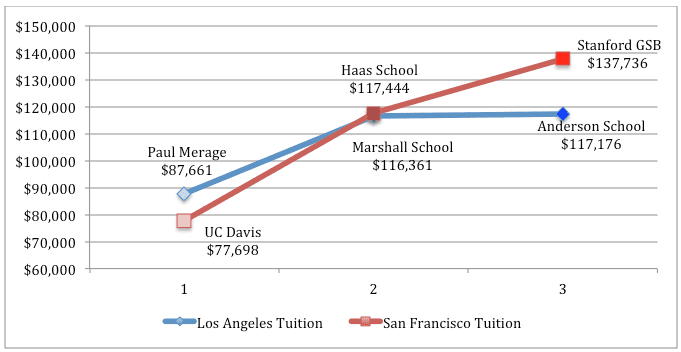
California MBA GMAT Averages
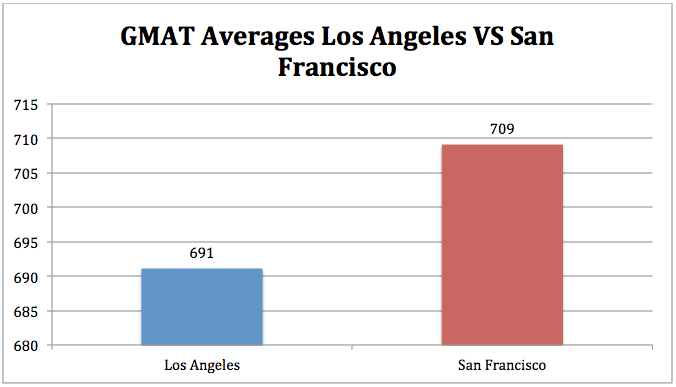
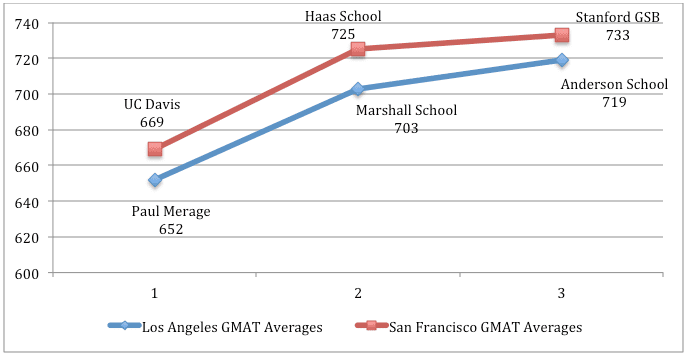
California MBA Post-Graduation Salaries
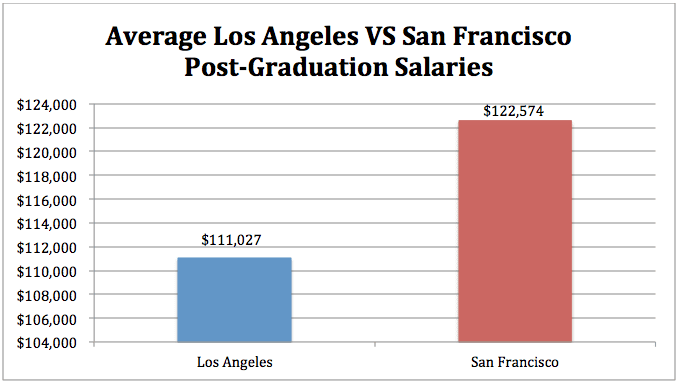
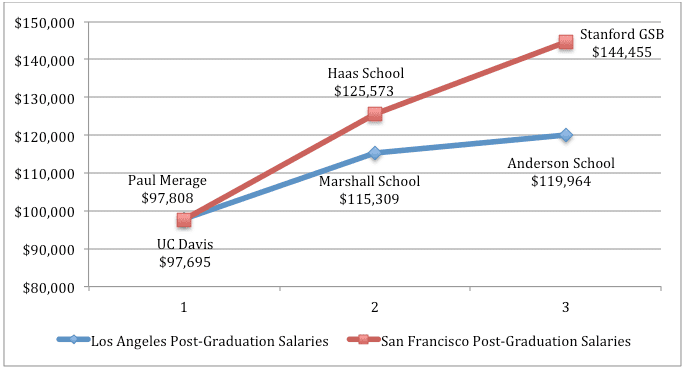
A Look At New York’s Best Real Estate MBA Programs

In 2017, the United States Commercial Real Estate Services group (CBRE), listed New York City’s real estate investments markets among the three largest in the world, sandwiched between Tokyo and Los Angeles. This makes New York City the perfect place to learn about the multi-faceted, constantly-evolving field of real estate. For aspiring MBA’s interested in pursuing real estate, we’ve laid out some of the best New York real estate MBA programs the metro has to offer.
The Best New York Real Estate MBA Programs
Columbia Business School
The oft-celebrated Columbia Business School MBA Real Estate Program emphasizes finance and investment management, headquartered at the Paul Milstein Center for Real Estate. There, according to the school, students will gain an education focused on “capital markets, entrepreneurship, and global business.” Since many of Columbia’s alumni remain in New York metro, the school has access to a large network of professionals to engage in speaking events, panels, and mentorship with current students. Students in this program must take Real Estate Finance, which the school considers the Real Estate program entry course. Students then take nine credits of real estate electives.
The Real Estate Private Equity class lets students gain real-world experience. Groups of students work with industry sponsors to develop a business plan and present their final projects to a panel of professionals. Given the hands-on private equity and investment experience provided by this course, it makes sense that in 2017, 46 percent of students who graduated from the MBA Real Estate program went on to careers in Investment Management/Private Equity.
Nearly 4 percent of the most recent MBA class from CBS entered the New York real estate industry, earning a median income of $120,000 per year and, of course, heavy amounts of extra compensation. These graduates earned positions at notable real estate firms, such as: Drake Real Estate Partners, GLL Real Estate Partners, Greystar Real Estate Partners, LLC, Summit Real Estate Group, LLC, TKF Real Estate Investment LLC, and Trilogy Real Estate Management.
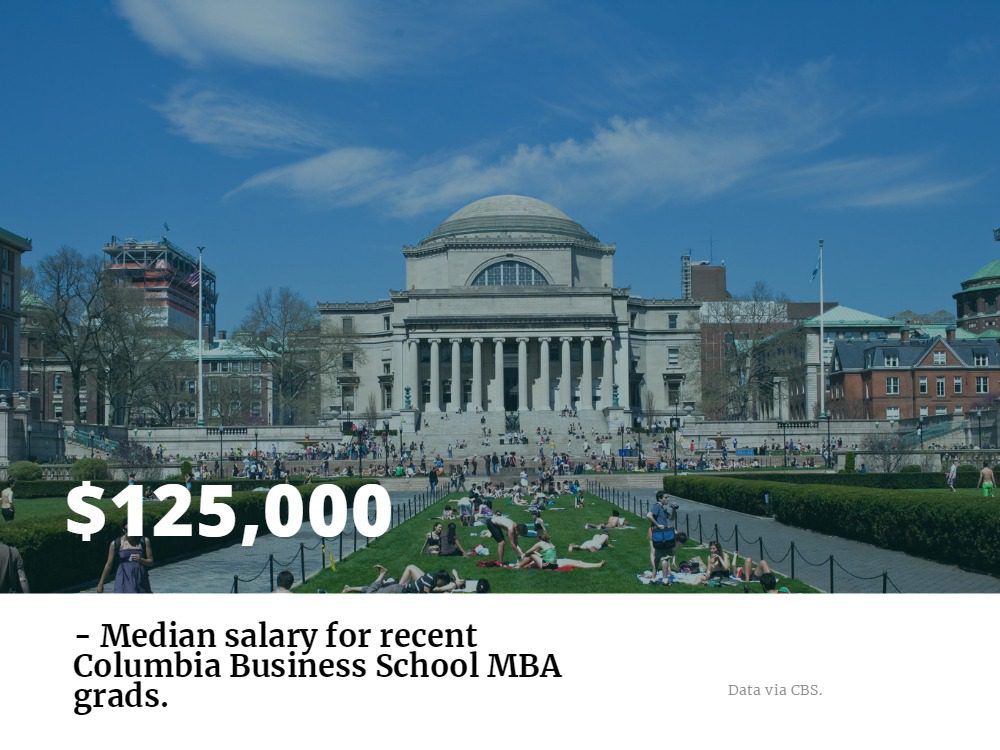
SC Johnson Graduate School of Management – Cornell University
At the Cornell University SC Johnson Graduate School of Management, students can pursue a dual degree in real estate and business administration. The MPS in Real Estate/MBA is a collaboration between Cornell SC Johnson’s School of Hotel Administration and Johnson. The dual degree spans six semesters (three years), and includes two summer internships. The first year of the degree is in either the real estate program or the MBA program, but students can take courses in both programs in the following semesters.
Students pursuing real estate at Cornell benefit from access to the the Cornell Real Estate Council, which the school promotes as “one of the largest university-based networks of real estate professionals in the world.”
YOU MAY ALSO LIKE: Finding the Best Real Estate MBAs in Los Angeles
Rutgers Business School, Newark and New Brunswick
The Real Estate Concentration at the Rutgers Business School in Newark and New Brunswick, New Jersey, has several objectives. The curriculum is geared toward arming students with the ability to assess investment risks in real estate markets, determine the best way to utilize a property based on market and demographic information, and gain a thorough knowledge of the legal intricacies involved in real estate. In addition to their elective and core MBA courses, b-schoolers with a real estate concentration are required to take the following courses: Aggregate Economic Analysis, Real Estate Development, Real Estate Law, and Real Estate Finance.
Stern School of Business – New York University
Any discussions of the best business schools in New York metro, and perhaps the world, are likely to include mention of the NYU Stern School of Business. Stern’s MBA with a Real Estate Specialization helps students understand the intricacies of real estate markets, financing real estate projects, real estate development, and managing real estate investments. The curriculum includes courses like: Real Estate Development and Entrepreneurship, Urban Systems, and Real Estate Investment Strategies.
One major perk of Stern’s program is its flexibility; Stern MBA’s can select up to three specializations, so students are not limited by their choice. Real estate is a vast field, with a multitude of facets. MBA’s interested in New York real estate might choose a secondary specialization to complement their specific interests, such as entrepreneurship and innovation or marketing.
Chicago Business Schools Prepare Students For Future Careers in Nonprofits

According to the Chicago Tribune, Windy City nonprofits reported a surge in spending and staffing in recent years. An annual survey by the CBRE Group, one of the world’s largest real estate companies, showed that 35 percent of Chicago-area nonprofits planned on expanding staff or office space, up from 24 percent reported in 2011. Additionally, 20 percent reportedly planned on increasing advocacy and marketing budgets, outpacing national averages. Continue reading…
